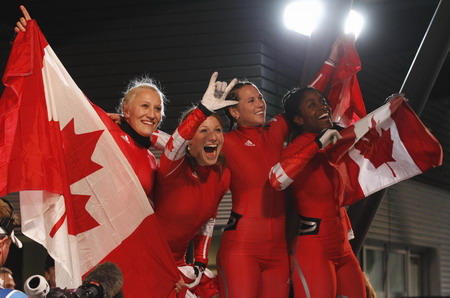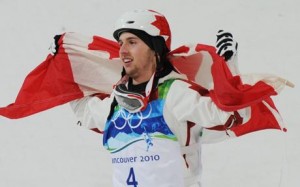In Defence of Own the Podium
 Wednesday was Canada’s best day for Olympic medals, with the teams of Kaillie Humphries/Heather Moyes and Helen Upperton/Shelley-Ann Brown winning gold and silver in a 1-2 punch in women’s two-person bobsleigh. The women's 5,000 metre speed skating relay team earned a silver medal. Adding to the medal haul was Clara Hughes, who earned her sixth career Olympic medal, a bronze in 5000m long track speed skating.
Wednesday was Canada’s best day for Olympic medals, with the teams of Kaillie Humphries/Heather Moyes and Helen Upperton/Shelley-Ann Brown winning gold and silver in a 1-2 punch in women’s two-person bobsleigh. The women's 5,000 metre speed skating relay team earned a silver medal. Adding to the medal haul was Clara Hughes, who earned her sixth career Olympic medal, a bronze in 5000m long track speed skating.
Although Team Canada’s 7-3 thrashing of the Russian Federation grabbed all the headlines, it was a banner day for Canada’s less glamorous Olympic sports that may have helped justify the Canadian Olympic Committee’s controversial Own the Podium program, just as it appears to be on its last legs.
Designed to give Canada the highest medal count at the 2010 Vancouver games, the Own the Podium program increased spending on winter Olympic sports by $21-million annually over the course of five years, with money coming from provincial and federal governments as well as private sponsors like Bell Canada. The goal was for Canada to earn a total of 35 podium finishes.
This plan has drawn criticism from all corners. Other countries (particularly the British media) have described it as an “un-Canadian” initiative. Apparently, it’s against the national character to be competitive in anything other than men’s hockey. A proposterous claim given that the Olympics, by definition, is about pushing the envelope and achieving new heights.
At the same time, some domestic media were unhappy that so much public funding - $118 million in total – was being spent on athletics when it could be applied to pressing issues like education, health care or the flagging economy.
As of this writing, Canada has stepped on to the podium 15 times, and might finish in the top three in men and women’s hockey, men and women’s curling and speed skating. Realistically, Canada will finish with around 20 medals, just shy of their 2006 Turin total of 24, and well short of Own the Podium’s stated goal of 35. On Monday, the COC announced that it was no longer aiming to top the medal tables at Vancouver.
In other words, CEO Roger Jackson and his staff have disappointed just about everybody, except the athletes.
Although the program has not met expectations, I think that in the long run it will make Canada into a more formidable sporting nation. At long last, Canadian athletes are getting the support they so richly deserve, allowing them to finally put their best foot forward in international competition.
Their performance at the Vancouver games will serve as an inspiration to Canada’s youth, spawning a new generation of world-class athletes. Yes, the money could have been spent on other projects, but giving Canadian children role models to look up to is certainly a worthy pursuit.
Further, this initiative is just catching Canada up to the rest of the world. In many cases, the athletes from other nations in the winter Olympics are members of the military.
For example, Tuffy LaTour, the coach of Canadian men’s bobsleigh team, is a retired army sergeant from the United States who competed with the American military’s sledding team.
Dan Humphries, the husband of Canadian gold medalist Kaillie Humphries, and a member of Canada’s four-man bobsleigh team, was originally a member of the British Army’s slidding team.
Heck, Finland won the Winter War against the Soviet Union by their superior biathlon skills.
Canada, with its significantly smaller population and military complex, needs a boost to its athletics programs, and Own the Podium is it.
Just as the Calgary Olympics created a home base for Canadian sports, the combination of the Vancouver games and Own the Podium will start a new golden age in the Canadian Olympic movement. It appears as though most of Own the Podium's sponsors, both public and private, will stop funding after the closing ceremonies this weekend, which would be a shame.
Australians raining on Bilodeau’s parade
 As Canadians across the country celebrated Alexandre Bilodeau’s freestyle moguls victory – the first Olympic gold won by a Canadian on home soil – the Australian delegation started to pour themselves a glass of fine whine.
As Canadians across the country celebrated Alexandre Bilodeau’s freestyle moguls victory – the first Olympic gold won by a Canadian on home soil – the Australian delegation started to pour themselves a glass of fine whine.
According to Dan Silkstone of the Sydney Morning Herald, the judges had put Bilodeau over Australian athlete Dale Begg-Smith who had to settle for silver to satisfy the Canadian hosts.
“It was the scores allocated to Bilodeau's turns - not traditionally his strong suit but Begg-Smith's undeniable strength - that had some in the Australian camp asking questions,” wrote Silkstone.
He then cited the Australian team’s high performance director, Geoff Lipshut: “My own opinion is probably that Alex is not capable of a 4.8 or 4.9 for turns. Just not capable.”
Lipshut did allow that Bilodeau out-paced Begg-Smith, an important criteria that judges always consider during competition.
“Dale could have been quicker,'' Lipshut said. “That's the bottom line: if Dale is three-tenths of a second quicker, Dale wins … You can say all the little things that you want, they are all small things. But you are probably not going to win by that. He had to be faster.”
So by the Australian delegation’s own admission, Bilodeau deserved to win, they’re just very disappointed. Silkstone, like many foreign journalists in Vancouver for the Olympics, are trying to make hay with Own the Podium and the Canadian Olympic Committee’s attempts to win as many medals as possible.
The British are also ragging on Canada’s Own the Podium program, but it comes across as just more bitterness. After all, what should Canada do? Not try to win? Not do their best? Nonsense.
Yes, Bilodeau’s win over Begg-Smith could be viewed by some as an upset, but thems the breaks. Sometimes underdogs come out on top.
Aside from some frustrated Aussies, no one has suggested that Bilodeau’s victory was anything less than legitimate.
Silkstone and his contacts on the Australian team are just chewing on sour grapes. At its core, the Olympics are about competition. Canada is finally stepping up its game and applying itself to winning as many medals as possible. Canadians can, and will, combine sportsmanship, class and athletic success at the Vancouver games.